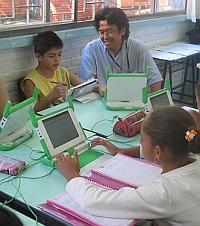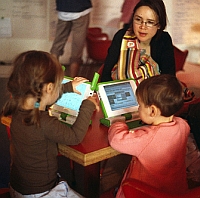I learned about One Laptop Per Child's "Give One Get One" plan in mid-2007, eventually receiving my own XO Laptop in early 2008. Thereafter I tinkered with my XO about 3 hours every night. I helped as a "Friend in Testing", so the experts could focus more on bug fixing. I watched the XO software evolve through dozens of builds, getting obviously better week by week. All the while, I followed Wayan's OLPCnews, hoping that OLPC would improve the world.
Today I still don't know where the world is going, but can say that OLPC has taught me a few things. In particular, I learned that some complex systems are impossible to fully understand, and difficult to improve. I refer to the XO itself, but also to humanity's situation. We cannot understand these systems with enough confidence to blithely make changes to them and then expect predictable results. Surprises happen. Efforts at change require multiple iterations around a feedback loop of "tinker, test, rethink, then try again".
It's not blind evolution because we humans do partly understand these complex systems, and we pursue goals. We can make educated guesses, tinker cleverly, pursue complex plans, and can even backtrack after failure. We use artificial selection, choosing thoughtfully from available alternatives, or sometimes we deliberately design totally new alternatives. Our intelligence drives unnaturally rapid evolution in everything we do.
Learning about evolution, especially the evolution of intelligence, has been my passion for years. I wonder if more awareness of intelligence-driven evolution might help projects like OLPC, so here I will review OLPC as an example of evolution in action.
Evolution happens when replicators are subject to both mutation and selection. In other words, change accumulates when some things get copied more than other things. In biology, the replicators are genes made of DNA. In human culture, the replicators are ideas or behaviours copied from person to person.
For one reason or another, some particular genes multiply more than others, and some particular ideas multiply more than others. Over time, incredibly complex ecosystems and cultures develop as genes and ideas proliferate, diversify, and interact in surprising ways. The basic process of evolution is simple, but the long-term effects are mind-boggling.
Can we exploit evolution, to accomplish a big goal like One Laptop Per Child? Yes, because we can influence replication, mutation, and selection of ideas that relate to the goal. To better educate the world's children, we want better ideas for many sub-tasks, e.g. selection, preparation, distribution, presentation, and evaluation of lessons. We need diverse educational techniques, so each child is exposed to whatever works for them in their particular circumstances. We must expect to use the iterative process of "tinker, test, rethink, then try again", in multiple environments.
A necessary requirement for evolution to occur is replication (copying) of information. The information could be encoded chemically in DNA, as human speech or action observed then remembered, as ink on paper, or as bit patterns in a computer or network. Modern technology has greatly increased our means for replicating information, which we must certainly do to educate a billion children. There are zillions of information packets that need to be replicated and distributed and stored into a billion young minds. Besides replicating educational content, we need to replicate all elements of the delivery system. We want to make all such replication as easy as possible. Mass-produced digital electronics looks to be part of the solution. Perhaps Nicholas Negroponte was thinking along these lines when he started OLPC.
The delivery system is where mutation is most needed. We do not yet have a good system for getting education to children everywhere. The OLPC XO-1 laptop was a major deliberate leap through design space towards the goal, in a clear example of intelligence-driven evolution. Many pre-existing technologies were adapted and remixed, with only a few iterations of hardware in a couple years being needed to demonstrate a possible solution. Of course, the XO-1 is not perfect, so the mutation effort continues, i.e., "tinker, test, rethink, then try again". In the meantime, over a million XO-1 laptops will enable new education experiments where more intelligence-driven evolution can occur.
A 'Good Trick' discovered by natural evolution is the mixing of genes in gene pools. A new previously-untried combination of genes working together in a newly-conceived organism is a macro-mutation of sorts, occurring more routinely than a DNA micro-mutation in just one gene. Another Good Trick is symbiotic cooperation of different organisms for mutual benefit. With these tricks, Nature tests more variations more quickly, and successful mutations are more rapidly distributed. Cultural evolution can use similar tricks. We mix many different ideas together in multiple combinations (every brain holds a different always-changing collection of ideas), multiple specialists work together toward shared goals, and we now augment our biological brains with networked computers. Online resources like OLPCnews.com and wiki.laptop.org accelerate mixing of ideas.
After with replication and mutation, the final requirement for cultural evolution is selection, to favour the replication of some ideas over others. Where intelligence is at work, an alternate word for 'selection' would be 'choice'. We must choose how to allocate our limited resources. We want to avoid replicating mistakes, so more resources will be available for mass-producing the best ideas.
Choice requires alternatives. In education, the choice might be between alternate brands of laptops, or simply between laptop or no laptop. Ideally, as many variations as possible would be tested in parallel, with selection events occurring frequently. In theory, over some period of time the bad ideas will be filtered out, and then only good ideas will dominate. But computer-assisted education is still new. Choosers have few alternatives, nor much data to help them make decisions. At present, they are working more with wishful theory than first-hand experience with mature products. If computer-assisted learning is ever convincingly proven superior, then the pace of evolution will accelerate as more choosers respond to that proof. But until efficacy is proven, conservatism will prevail, which means teach the old way, without computers.
We can have extra influence on intelligence-driven evolution by choosing the choosers. For example, one project plan might stipulate that only governments can choose to purchase educational laptops, and only in large quantity. A different plan might make laptops choosable by anyone in any quantity. Another example is in curriculum selection... Should educational curriculae be specified from high up, or should front-line teachers or even students choose what to teach or learn? While each of us might have opinions, in truth the world is too complex for anyone to be certain about any plan. We must try many different plans in parallel and let evolution sort it out. Experimentation is inevitable. No one can be expected to optimally solve a complicated problem on the first try. People must accept occasional (even frequent) failures, until enough successes clearly demonstrate appropriate methods for achieving goals.
Why are certain choices made, and do those choices align with project goals? For example, a corrupt official might choose one supplier over another because of a bribe, rather than because of product merit. We prefer a chooser's motivations to align with project goals. Having many choosers close to the students seems appropriate; e.g., get parents involved in choosing educational resources for their children. But this might not work well if those parents are themselves poorly educated or unable to make informed decisions, or cannot afford to buy laptops. A similar problem occurs in the selection of educational content.
An inexperienced child or parent is going to be overwhelmed by information overload when equipped with a networked laptop. They are unlikely by themselves to select appropriate material to study, in an optimum sequence. So we need experienced teachers (or automated equivalents) to guide learning along an efficient path. Even mature graduate students can benefit immensely from the guidance of more-experienced professors, because there are so many ways to drift off course. Sure we can learn from mistakes, but when there are an infinite number of mistakes that can be made, it is easier to imitate a known successful model.
All the time we must be on guard against influences or obstacles that would thwart education. We must ensure that appropriate information continues to be made available for replication, and is in fact chosen for assimilation instead of less desirable distracting information. In other words, keep the lessons and ebooks flowing into the laptops, and keep the porn and brainless shooter games away. The preferred replicators need protection from weeds that compete for mindspace. We must select 'for' what is good for education, and select 'against' what is bad. Perhaps this is easier said than done, but remember that "whoever pays the bills makes the rules". Might it be feasible to constrain the XO web browser to the '.edu' top-level domain name space, to eliminate most of the distractions of the complete world-wide web?
We make choices based on what we believe, which sadly is not always the truth. More education might help us distinguish the one real truth from our infinitely numerous fantasies. The better we are grounded in truth, the better we can get whatever we want. I hope that OLPC does improve education, but if that is just fantasy then it would be better to learn that as soon as possible, then we can try something else.

Evolution of penmanship
Reports indicate that school attendance improves after XO laptops are introduced, so children (and their parents) are apparently choosing in favour of OLPC. Strong selection pressures drive rapid evolution, so I am very optimistic for the future of OLPC.
Now some discussion about platforms.... In biology, nature long ago settled on a lowest common denominator for life, namely DNA-based genes and protein-based molecular machinery for copying them. This lowest common denominator has been incredibly successful, enabling life to spread all over the Earth. In human cultural evolution the human brain appears to be the lowest common denominator. The replicating information that drives culture is spread by a plethora of spoken languages and also now by technical media. Particularly successful information technologies point to the desirability of standards for information transfer. Think of alphabets, ink on paper, ASCII, HTML, PDF, MP3, JPEG, USB, and TCP/IP. Where would we be without these standards?
Now we can use technology to deliver pre-recorded multimedia lessons to students, as an alternative to traditional face-to-face communication with a teacher. But right now there is no clear technical standard for how to package a lesson as a digital file, and there is no industry-standard playback device or application software for presenting packaged lessons. Existing multimedia standards are not optimized for effective learning, having evolved mostly for non-educational purposes such as entertainment or business. Lessons often require more interaction than a YouTube video or a PowerPoint slideshow allows for. Traditional teaching enables feedback from student to teacher. Some appropriate substitute interaction probably should be designed into any new education technology that would attempt to replace a human teacher.
The point here is that we need a new standard technical specification, and supporting infrastructure, for how to package digital lessons and present them to students. Such a standard would encourage widespread replication of both packaged lessons and the presentation gadgets, similar to how MP3 files and music players have replicated in huge numbers. Perhaps someone can step forward to clearly specify some such lesson-packaging standard. Of course, it could come about through intelligence-driven evolution starting from a deliberate design leap.
I believe most general-purpose computing platforms now on the market (including the XO-1) are overkill, overly complex, and too expensive for primary education. Something simpler might be better for presenting packaged lessons. The lowest common denominator Learning Machine (LM-1?) could be a subset of a more powerful platform (e.g. an application program on a PC or XO), but should also be available as a cheap dedicated minimalist gadget all by itself.
Imagine browsing a catalog of packaged lessons, and seeing "System Requirements: LM-1". Whatever it is, I suspect if LM-1 is sufficient to teach a child to read, it will be a winner. Beyond LM-1, there could be a range of more capable superset platforms (e.g. LM-2, LM-3) at greater cost, for those who need or can afford them. But the lowest common denominator must be established first. We don't have it yet. When we do, education technology will have a standard for mass replication of both hardware and software.
I emphasize that LM-1 need not satisfy every education requirement. Feature creep must be resisted. I suspect LM-1 does not need WiFi, a camera, a microphone, a digitizer tablet, collaboration support, mesh networking, a View Source function, nor complicated security. I do believe it does need basic audio/video playback, interactivity, some programmability (for running provided content software), and lots of local file storage, perhaps refreshed with content from a community digital broadcast transmitter (think of the XO NAND-Blaster feature). Too many features would divert attention away from learning, besides adding cost and problems. I think OLPC mostly overshot the requirements with the XO design.
Could LM-1 run on an iPod Touch, Nintendo DSi, or similar common gadget? What hardware is adequate for the lowest common denominator learning machine? What minimum hardware can replace a primary school teacher, to teach a child to read? I believe this question will be answered by "tinker, test, rethink, then try again", i.e. by intelligence-driven evolution. It would be wonderful if someone could make the leap through design space to get us there faster. Maybe we are already pretty close with netbooks or media players. Much of the needed mutation will be in software. Might we get closer to LM-1 just by pruning the complexity we already have? LM-1 could do more than just teach children. It could also present userguides, product manuals, workplace training modules, cooking recipes, etc., anytime something needs to be taught. There could be some profit from selling LM-1 in the developed world. As previously mentioned, LM-1 could be a subset of a more powerful tool like a laptop or a smartphone.
Next up is the challenge of keeping the replicators alive. Biological life needs energy and chemical building blocks. Culture needs human brains to host ideas, plus appropriate motivation to pass them along. Motivating factors for education might include curiousity, love of children, competitive instinct, social instinct, desire to solve problems, even desire to avoid boredom. What motivations keep alive such educational institutions as schools, libraries, the Web, or Wikipedia?
What motivations can we most exploit to propagate education-related technology and content? Will the profit motive play a big part? Win-win motivations are effective stimulators, but sometimes we must rely on other drivers. There are two sides to education, namely teachers and students, with different motivations. We need to exploit whatever motivations help to overcome the quandary of who pays vs. who benefits from education, especially for helping poor students. Humans seem to have evolved some aptitude for both teaching and learning, probably because those are beneficial behaviours for human survival.
A recurring phenomenon in natural evolution is adaptation, of organisms to new environments, or of organic parts to new uses. Some ancient fish adapted their lobed fins for crawling, then further evolved to colonize dry land, some to fly. Some descendents of the early tetrapods can now surf the Web. Gradual evolution enables diverse niches to be filled. The OLPC XO is not affordable by poorer countries, but has a fin-hold in some wealthier ones. Intelligence-driven evolution will mutate the design towards lower cost so that someday many more countries can afford XO's. Similarly, successful teaching materials will be translated into multiple languages, and ported to multiple platforms.
Anything we can do to facilitate adaptation will accelerate evolution. Adaptation is easier when ideas have no intellectual property constraints. Multi-purpose tools that can be used for education and communication and productivity will infiltrate more niches than any single-purpose gadget. But some adaptations could work contrary to the education goal, so we must maintain appropriate selection pressures. Beware of mindless time-wasting addictive games.
Yet another Good Trick invented first by Nature's blind evolution is what might be called meta-genes, or high-level genes that control the activity of lower-level genes. These are especially important in complex multi-cellular organisms like ourselves with heterogeneous physical form developed by time-and-space-sequenced embryology. In culture, we have evolved the similar phenomenon of meta-ideas or meta-knowledge; that is to say, ideas about ideas, or knowledge about knowledge.
Someone like Nicholas Negroponte comes along and wonders if children can 'learn learning' when given appropriate tools. Then starts an incredible process of idea-promotion and team building and organization that over time puts a million XO laptops into the hands of children in dozens of countries. Meta-ideas certainly can be powerful! A more classic example is the Scientific Method, a meta-idea useful for separating truth from fiction. Darwinian evolution itself is a powerful concept for understanding biology. I hope a better awareness of cultural evolution gives more power to everyone dreaming the OLPC dream.
Something happened during human evolution, that made us creatures of culture as well as biology. Some kind of positive-feedback loop started, perhaps having to do with our ability to use symbols to think. Can we fine-tune that feedback loop? Imagine that the extra intelligence fostered by OLPC feeds back into OLPC, improving it. How far can we go, when intelligence works to improve itself?
While speculation about the future is fun, progress is made in the present, building on top of what we have built in the past. At the moment we have pretty good technology for handling information, but not everyone has access to it yet. OLPC has reworked the existing technology, making it accessible to more people, especially children. There is much complementary work that could be done with other technologies, to support the OLPC effort. Provision of cheap electricity to more people would certainly help.
There is also a lot of meta-knowledge work needed to select just what knowledge subset should be taught, in what sequence, and how. Non-technological cultural change might also help some people, e.g. replacing corrupt kleptocracies or coercive social structures with more cooperative win-win mindsets. Humans have experimented with many different social structures, but have not yet become expert at choosing and replicating the best ones. OLPC might help more people learn about alternatives.
In summary, understanding evolution might help us accomplish really big projects. Pursuing the mission of OLPC, we can use the intelligence we have now to get even more intelligence in the future, through intelligence-driven evolution. The OLPC mission would benefit from purpose-designed hardware, software, and behaviours that are easy to replicate, easy to mutate or adapt, and easy to choose. Then humans by the billions will evolve education very fast.
This document is public-domain so that it will be easy to replicate and easy to mutate by anyone who chooses to do so for any reason, signed or unsigned. Do whatever you want. Edited by original author ThomasWamm.





Thanks, olpcnews, for posting this essay, plus the value-added pictures that spice up the long text.
Anyone who wishes to copy the essay, please correct my typo:
c/After with replication/After replication/
The first question that has to be asked about LM-1 is whether the simplification saves enough cost to be worthwhile. I am sure the designers of the XO (who were aiming at a $100 build cost) did not put in any high cost frill.
The reason that all laptops provide wifi, usb, and many other features is that it is built in to the chipset and the incremental cost is providing a connection/connector.
Let's face it. The problem is that catalog of packaged lessons. It is nearly empty. The issue is not packaging or standards, but content. It will take time and creative talent to build that catalog. The good news is that like all software, the catalog will easily be executable on the next and succeeding generations of hardware platforms (after all, you can still execute Atari games and, very likely, Apple II and Commodore 64 games).